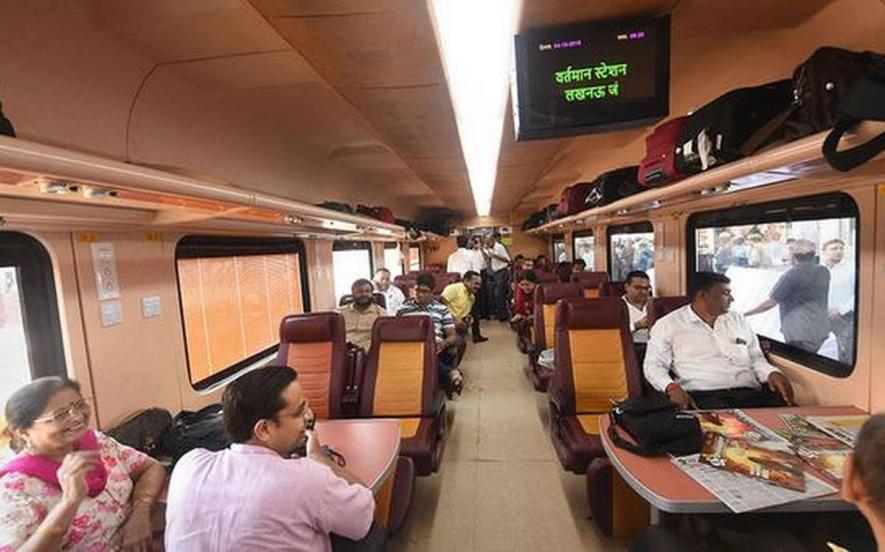Bumpy Ride for Private Trains with Many Roadblocks Ahead

Image for representational use only.Image Courtesy : The Hindu
New Delhi, Jul 27: The entry of private players in passenger train operations is slated to be a challenging one and certainly not a rosy affair despite the sentiments expressed over the first of its kind initiative by the Indian Railways.
Railways has opened 109 routes with 151 trains for private train operations at an estimated cost of Rs 30,000 crore and has floated the tenders accordingly.
However, the very first pre-bid meeting got no response from the Tata group or Adani group while 16 private entities including GMR, Bombardier, Medha, and Bharat Forge, among others, participated.
Railways maintain this is just the first one and there would be more such conferences before deciding on the tender as one can always participate at the later stage also.
Amid a global pandemic, investment from private players is very unlikely as the expenditure requirement is huge in the passenger service, said an insider working with the railways.
It is assumed that since private players would make a heavy investment for rolling stock, undertake maintenance and pay haulage charges, there is unlikely to be any profit without hiking the fare considerably.
According to the bidding document, bidders can decide on the stoppage of a particular route while energy cost has been separated from the haulage charge, which is being kept at Rs 540 per kilometre.
Though the entry of private players in the passenger segment is expected to bring modern rolling stock and enhance amenities for rail users, 151 private trains will account for only a minuscule part of the passenger service.
According to the timeline, the first batch of private trains is expected to be operational by April 2023 and by 2027, all 151 trains are expected to be running.
The public transporter will select the companies that will run the private trains by April 2021; the first 12 are expected to start running by 2023-24, followed by 45 more in the financial year 2024-25, the next 50 in the financial year 2025-26 and the last 44 by 2026-27.
In the first pre-bid meeting, there were queries from private players about the pre-selected routes and they requested flexibility in choosing routes and timing.
Describing the decision as "wrong and unethical," National Federation of Indian Railwaymen General Secretary M Raghavaiah said, "Though it constitutes only 5% for the upper-class passengers, 63% of the revenue would go to private players. They would charge heavily for catering, amenities, and other facilities, which is nothing but exploitation. We are leaving the general public at the mercy of private players."
Railways maintains that the introduction of private trains would reduce the gap between demand and supply, which seems far-fetched as only a minuscule of total passengers would be able to avail the services.
According to the railways, about 5 crore passengers were wait-listed in 2019 as there is a gap between demand and supply of available tickets.
Raghavaiah further said after the gradual entry of private players, railways will be left with suburban and general class passengers which is not going to benefit the public transporter.
In the absence of a regulator, very high charges is always a possibility.
All India Railwaymen's Federation General Secretary Shiv Gopal Mishra said, "We are opposing the privatisation move which is nothing but exploitation of the passengers. Though railways is maintaining that it would not affect the employees, we know it would affect them in the long run."
It is expected that allowing the private sector to operate passenger trains would be meant for the high-end traveller segment only with the addition of some modern train sets.
Mishra said, "We have drawn the attention of the railway minister and chairman of the Railway Board to the pitfalls of privatisation as it has failed everywhere."
According to the plan, private trains would run along 12 clusters across the rail network. The railways has planned two clusters each in Delhi and Mumbai, and one cluster each in Secunderabad, Chennai, Howrah, Jaipur, Prayagraj, Chandigarh, Bengaluru, and Patna.
Though railways hope that allowing multiple operators in train operations is going to create competition and improve service delivery in the long run, it remains to be seen whether private trains are enhancing the overall operational efficiency of the Railways or bring in investments for expansion and upgrade of the railway network.
Allaying fears about the rail network being handed over to private parties, the Railway Board has maintained that private participation in passenger train operations will only be 5% of the existing 2,800 mail/express trains.
"There are 2,800 mail/express trains out of which only 151 are being offered on PPP mode, which is just 5.1% of the total trains," Chairman of the Railway Board, VK Yadav, said and added, "Currently, a significant chunk of passengers do not get confirmed tickets; so, the aim is to reduce the waiting list by providing more seats."
It is an established fact that revenues from train fares rarely meet the entire operational costs. So, despite the increased fares, the private players will have to explore ways to make the project viable.
Arun Kumar Das is a Delhi-based journalist and can be contacted at [email protected].
Also read: What Could Be Wrong with a Fiscal Deficit?
Get the latest reports & analysis with people's perspective on Protests, movements & deep analytical videos, discussions of the current affairs in your Telegram app. Subscribe to NewsClick's Telegram channel & get Real-Time updates on stories, as they get published on our website.
























